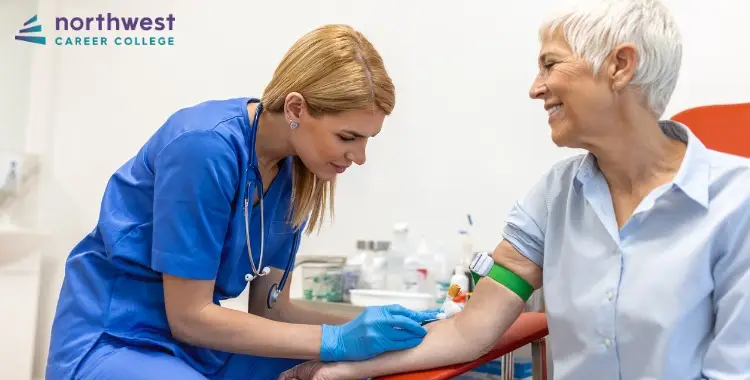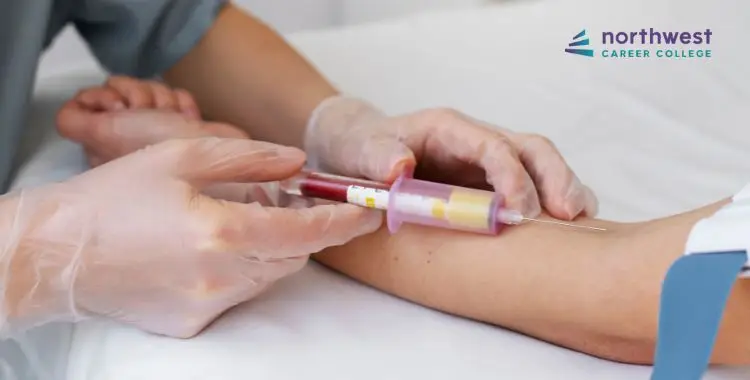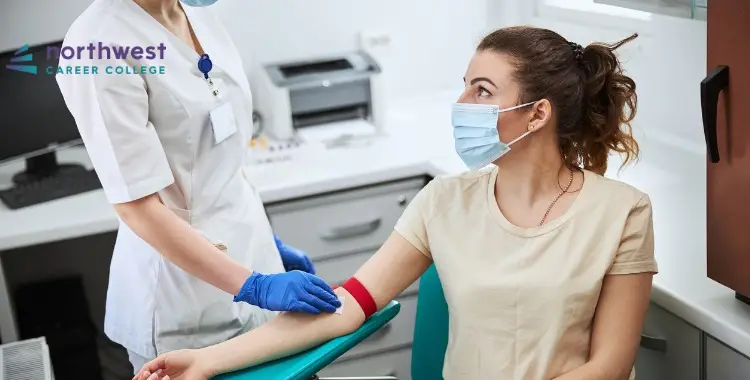How to Prepare for the Certified Phlebotomy Technician Exam
- Phlebotomy Technician
- March 12, 2024
- 3.2k views
- 5 min read

If you are like most students, standardized testing is likely something you don’t look forward to and possibly even dread. Many people get testing anxiety, but it is an avoidable stressor if you know how to prepare for your exam properly.
If you are a phlebotomy technician student seeking to enter the field, you will likely need to pass a certification exam to qualify for a license. There are several commonly accepted certification exams, and rather than address specific content on a specific exam, this article will provide principles that will help you prepare for any certification exam.
Table of Contents
Understanding the Exam Structure
One of the most effective ways to combat test anxiety is to ensure that you understand the structure, length, format, and timeframe of your exam. this will ensure that you can do appropriate practice before game day.
Exam Content
You must review the content outlined as you prepare for your certified phlebotomy technician exam. Typical topics for this industry include patient preparation for procedures, routine, blood collections, and the order of draw, special collections, procedures, specimen, processing procedures, and safety and compliance.
Each section has a mixture of questions regarding theoretical knowledge and practical, task-related knowledge. You must review all sections of the exam outline to study correctly.
Format and Timeframe
The certified phlebotomy technician exam is a two-hour exam and consists of 120 multiple-choice questions. It is essential to practice this length and style of exam in advance to develop your mental stamina and stay sharp throughout the entire exam without getting overwhelmed. It also will help you manage your time effectively so that you do not get rushed near the end of the test due to poor time management.
Effective Studies Strategies
Create a Study Plan
If you don’t explicitly allocate time on your calendar to prepare for the certified phlebotomy technician exam, it is improbable that you will spend enough time preparing for the test.
A helpful way to hold yourself accountable for spending enough time preparing for the test is to create a study plan. By creating a plan, you will be forced to identify the order in which you plan to review topics, the deadlines you plan to meet as you study, and the amount of time you intend to study each topic.
Remember to set realistic goals, including how many hours per day and week you can study, given your other commitments to family, work, etc. Schedule breaks to avoid burnout, as slow but steady progress is much more effective than cramming for the exam.
Finally, focus more time on areas where you need improvement, as high performance in some areas of the exam is often insufficient to balance out poor performance in specific areas.
Utilizing Study Resources
There are many free and paid resources available to help prepare you for your certified phlebotomy technician exam if you attend an accredited school like Northwest Career College, your curriculum will likely be tailored to the content outline for at least one of the major phlebotomy technician exams.
Other resources are available, such as NHA’s official study guide, your phlebotomy textbook, online forums, and even YouTube tutorials. It is typically more effective for people to consume content in various formats when they have difficulty remembering or mastering a topic, as one of them will sometimes stick unexpectedly and help you get the correct answer during your exam.
Practice exams
The most important thing you can do to prepare for your certified phlebotomy technician exam is to take practice exams regularly. Studies have shown that practicing standardized tests can significantly improve your performance on game day. Furthermore, it just makes sense.
Practice exams help you familiarize yourself with exam content, as they are designed to cover the same topics as the actual exam. They also help you become comfortable with the format and timeframe, as practicing full-length exams will help you develop stamina and give you peace of mind that you can make it through the test.
Beyond the fundamental preparation that they provide, practice exams also can help you correctly allocate time within your study plan, as they will highlight for you those topics where you are strong (and therefore need less practice) as well as those where you are weak (and therefore need to study more). You can make better use of your resources so that you can understand the content and apply your knowledge in an exam-specific context.
Joining a Study Group
The odds are that you know at least one other student preparing for the exam if you take the certified phlebotomy technician exam as part of your educational training program. Collaborate with your peers in study groups to help enhance your learning.
These can be student-directed or conducted under the supervision of an instructor. it can be very beneficial to quiz each other and discuss challenging topics. Teaching is the best way to learn something, and helping explain difficult topics to your classmates will reinforce your knowledge and confidence with the exam material.
Conclusion
These are just a few tips and tricks you can use as you prepare for your certified phlebotomy technician exam. As you can see, none of these are specific to phlebotomy, so if you pursue additional education after becoming a phlebotomy technician, remember that these strategies can help you ace any certification test.
Focus on the fundamentals, such as learning and familiarizing yourself with the exam structure, covering all exam content during your study sessions, and regularly assessing your knowledge with practicing exams. You’ve got this!





